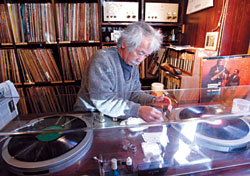Why the Japanese iPod generation is tuning out of all that jazz
YOKOHAMA: Once a haven for Japan's earliest jazz fans, cafe Chigusa is packing up its thousands of vinyl records.
"These days, kids don't listen to jazz, and they walk down the street with iPods, which makes the whole idea of 'place' irrelevant," says Michael Molasky, author of The Jazz Culture of Postwar Japan.
Seventy-three years after first opening its doors, Chigusa, among the oldest and the most cherished of Japan's jazz coffee shops, has become a victim of the electronic revolution.
Masatomi Kaneshige, a jazz music fan, sets an analogue record on a turn table at Chigusa, Japan's oldest jazz cafe founded in 1933 in Yokohama, south of Tokyo. AFP |
"Filled with sound, smoke, and hundreds of records, jazz coffee houses used to be a space for young people who came looking for a proper understanding of the music," says Molasky, professor of Asian languages and literature at the University of Minnesota.
Chigusa enjoyed a glorious epoch in the 1960s and early 70s, when students and musicians gathered to listen to imported albums that were otherwise beyond their means.
"Now we only have about 10 regulars, who've been coming for years," says Masatomi Kaneshige, a 65-year-old retiree who often helps out at the cafe.
"Young people hardly come here. This place must look so strange and dark to them, with old men sitting quietly, sipping coffee and listening to vibrant jazz."
Chigusa, soon to be replaced by a new building complex, was opened in 1937 by 20-year-old Mamoru Yoshida, who fell in love with jazz at public dance halls and began collecting imported records.
"There was a huge jazz boom triggered by the arrival of French new wave movies and Hollywood films that used modern jazz," Molasky said.
But then, rock and punk came along, as did CDs and better personal audio systems. The fever for jazz began to fade. After founder Yoshino passed away, his younger sister Takako Yoshida took over Chigusa. Lately, though, Takako, now 77, found it difficult to run the place on her own.
For long-time regulars like Masayuki Isozaki, everything from the walls yellowed by cigarette smoke to the simple menu of 500 yen ($4) coffee, tea and soda were the reasons that drew him to Chigusa almost every week since the age of 20.
But jazz coffee houses are not only about what went before. "Yes, times are changing and many old cafes are closing," said 36-year old Yusuke Miyamoto, who grew up in the neighborhood. "But there are some new ones opening up and many young people like jazz too, including me, who picked up the alto saxophone after I started going to these coffee shops."
Yukio Saito, 31, started an online community for jazz coffee shop owners and customers in 1997. There are now around 100 listed on the Web site, which posts events and reviews.
Agencies
(China Daily 01/30/2007 page19)















